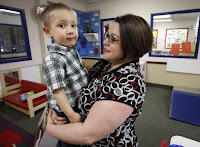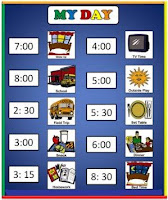Sherman Oaks and Culver City, California
Village Glen School—
Sponsored by the The Help Group, the Village Glen School is a therapeutic day school program for kids with challenges in the areas of socialization, communication, language development, peer relations, learning disabilities, and academic performance without significant behavior problems. Many of the clients served at Village Glen experience special needs related to Aspergers and high functioning autism. Visit their web site at: www.villageglen.org
East Bay, California
The Springstone School—
The Springstone School, located in Concord, California, is an independent middle school that promotes and develops academic, social and prevocational skills for clients with Aspergers and Nonverbal Learning Disabilities. The professional and experienced staff fosters values of independence, responsibility and community in preparation for high school, and beyond through intensive, individualized instruction in small structured classrooms.
Contact Information:
The Springstone School
1035 Carol Lane
Lafayette, CA 94549
(925)962-9660
Fax: (925) 962-9558
email: info@thespringstoneschool.org
website: www.thespringstoneschool.org Please visit their web site at: The Springstone School
San Francisco Bay Area, California
Orion Academy—
Orion Academy is a nonprofit College Preparatory Day School located in San Francisco's East Bay area for High School Clients with Neurocognitive Disabilities.
Mission: To educate secondary clients with NLD, Aspergers and Other neurocognitive disorders in a program that equally emphasizes academics, social competency and pragmatic language development.
If you are interested in more information about this school, please contact Rosemary at 925-377-0789 or visit their web site at www.orionacademy.org
Newbury Park, California
Passageway School—
Day School for kids with Asperger syndrome.
Our Philosophy is to work with kids in small classroom settings. (4 to 7 kids per class). Tailor their education to their IEP's and to work individually on their behaviors thru positive reinforcement. Our class day tends to be very structured. We do allow and encourage the kids to develop their individuality, while maintaining classroom discipline. Our discipline methods are developed according to the needs of the child. We prefer to use reward systems that daily and weekly inspire the child to change his or her behavior.
Contact Shirley Juels at 805-375-4950
or e-mail to: PassagewaySchool@aol.com
or, visit their web site at www.passagewayschool.com
Bethlehem, Connecticut
Woodhall School—
Males residential school.
For information contact:
Woodhall School
PO Box 550, Harrison Lane
Bethlehem, CT 06751-0550
Phone: 203-266-7788
East Haddam, Connecticut
Franklin Academy—
This is a boarding school program.
For more information:
Franklin Academy
106 River Road
East Haddam, CT 06423
Phone:860-873-2700
Fax: 860-873-8861 admission@fa-ct.org
or visit their web site at: www.fa-ct.org
Washington, Connecticut
Glenholme School—
The Glenholme School is a boarding school for "special needs clients situated on over 100 idyllic acres of Connecticut countryside. Kids ages 8-16, at admission, who need a highly structured learning environment can prosper in this safe, nurturing school. It provides a value-based program to show clients the way to academic success."
Visit their web site at: http://www.theglenholmeschool.org/os
Melbourne, Florida
The College Internship Program—
"The College Internship Program at the Brevard Center provides individualized, post-secondary academic, internship and independent living experiences for young adults with Aspergers and Nonverbal learning differences. With our support and direction, clients learn to realize and develop their potential."
For information about their program visit their web site at: www.brevardcenter.org
Carbondale, Illinois
Brehm Preparatory School—
"Empowering Clients with Complex Learning Disabilities to Optimize their full potential."
For more information contact:
Brehm Preparatory School
1245 East Grand Avenue
Carbondale, IL 62901
618.457.0371
fax 618.529.1248
Email to: brehm1@brehm.org
Visit their web site at: www.brehm.org
Baltimore, Maryland
The Millennium School Opening Fall of 2004—
The Millennium Day School in Baltimore, Maryland will open its doors in the Fall of 2004. The school will have a fully integrated social skills curriculum and will serve the needs of kids with Aspergers and related disorders in an inclusive environment. For further information, visit their web site at www.MillenniumSchool.com
Boston, Massachusetts
McLean Hospital - Kennedy Hope Academy—
The Kennedy Hope Academy is a 13-bed residential school providing intensive treatment for kids with pervasive developmental disorders who have serious psychiatric illness or behavior problems.
If you are interested in more information about this program, please contact:
David Rourke, MS
Program Manager
(617) 779-1670
or visit our website at www.mclean.harvard.edu/patient/child/kha.php
Belmont, Massachusetts
Pathways Academy—
McLean Hospital
115 Mill Street
Belmont, Massachusetts 02178
617-855-2847
For more information send an e-mail to Sarah Medeiros at medeirs@mcleanpo.Mclean.org
Visit their web site at www.mclean.harvard.edu/cns/pathways.htm
This school is for AS kids from ages 1st -12th Grade.
McLean Hospital is a Teaching Facility of Harvard Medical School and an Affiliate of Massachusetts General Hospital
Sudbury, Massachusetts
Corwin Russell School—
"The Corwin-Russell School at Broccoli Hall is an independent school for high-potential clients 11-19 years old with varied learning styles, average to superior intelligence, exceptional creativity, attentional issues, untapped interests, talents, and strengths, and disparity between innate ability and past production."
For more information:
Phone: 978-369-1444
E-mail: brochall@aol.com
Or visit their web site at: www.corwin-russell.org
New York, New York
LearningSpring Academy—
A Model School for High-Functioning Elementary School Kids Grades K-5 with Asperger Syndrome and Pervasive Developmental Disorders
For more information visit their webpage at http://www.learningspring.org
Boiceville, New York
ASPIE: The School for Autistic Strenth, Purpose, and Independence in Education—
This Day school is for teens with AS, HFA, PDD and cousin disabilities. Serves clients within busing are of Boiceville, New York.
For more information contact:
Valerie Paradiz, Ph.D.
Program Director
ASPlE
The School for Autistic Strength, Purpose and Independence in Education
P.O. Box 489
Boiceville, NY 12412
(845) 657-7201
email to: info@aspieschool.org
Visit their web site at: www.aspieschool.org
Huntington Station, Long Island, New York
Gersh Academy—
The I Am I Can Program was developed for high functioning clients with Neurobiological Disorders (NBD), including Attention Deficit Hyperactivity Disorder, Tourette’s Syndrome, Aspergers, Childhood-Onset Bipolar Disorder, Obsessive-Compulsive Disorder, Anxiety Disorder and Depression. The program uses a cognitive behavioral approach, allowing clients to better understand their neurobiological limitations and how to self-manage and regulate their symptoms. The Elementary Program (K-5) is a 6:1:1 ratio and the Middle School (6-8) and High School Programs have an 8:1:1 ratio. The Gersh Academy High School is located in Hauppauge. Gersh Academy follows the New York State curriculum and standards.
For More Information Contact:
West Hills Montessori School
165 Pidgeon Hill Road
Huntington Station, NY 11746
Phone: (631) 385-3342
Web site: www.gershacademy.org
Cherry Hill, New Jersey and Medford Lakes, New Jersey
Y.A.L.E. School—
The Y.A.L.E. School offers specialized progarm options for kids with Aspergers. Serves kids ages 8-15. This program offers rich academic environment, speech and language services, social skill training and postive motivational systems.
For additional program information or to schedule a program tour, contact Jim Conley at 856-795-3566 ext. 106 or Dr. Mieke Gooseens at 856-795.3566, ext. 309
Rindge, New Hamsphire
Hampshire Country School—
From their web site:
"...The best candidates for Hampshire Country School are those who will respond to the attention of its faculty, seek the help of its teachers, enjoy being part of a small school community, and enjoy its outdoor activities. Most clients, however, have not had such success elsewhere, and many parents are quite discouraged by the time they first inquire about the school. Many clients have had trouble fitting into the structure of larger schools and many have had difficulty adapting to the demands of peers. Many are more comfortable with adults than with age mates.
Hampshire Country School can provide appropriate structure and support for certain clients with nonverbal learning disabilities, Tourette Syndrome, ADHD, Asperger Syndrome, and other disorders; but it is not a treatment program. It is designed instead to involve and educate the bright, active, and interested side of each child rather than to dwell on the student's limitations and difficulties. Clients who experiment with alcohol, tobacco, or illegal drugs are not accepted; and the school is not set up for clients who are primarily oppositional or confrontational..."
For more information, visit their web site at: www.hampshirecountryschool.org
Toledo, Ohio
LHS Maumee Youth Center for Asperger’s Disorder—
A new residential center for kids and youth ages six to eighteen-plus who have been diagnosed with Asperger’s Disorder is opening. The Center is situated on 13 acres near Neapolis, Ohio, south of Toledo, Ohio. LHS Family and Youth Services, Inc. is a social service agency with headquarters in Toledo, Ohio, serving kids, youth and families through community-based residential treatment group homes and other services.
The LHS Maumee Youth Center for Asperger’s Disorder serves up to twenty kids and youth in its residential program. Most kids and youth placed in the residential setting will tend to be aggressive and have multiple diagnosis/needs.
All staff, in addition to their undergraduate and graduate work, are trained in the core competencies of residential child and youth care and will be trained by experts in the autistic spectrum disorder field.
For additional information on the Center, or to make an inquiry regarding a potential referral to the Center, please contact Steve Plottner at splot@infinet.com or by phone at 419-798-9382.
Houston, Texas
The Monarch School—
The Monarch School is a therapeutic day school located in Houston. Their prime mission is to help kids develop executive functioning skills, relationship development and ownership of learning and to prepare all of the clients for success.
About 1/4 of the clients are AS with the other's having ADHD, LD, Bi-polar disorder, Tourettes and other dx.
The school is for kids from 4-16 and they will be adding one additional HS year each year for the next two years. It is a non-profit, private school and the staff to student ratio is 20 staff to 60 clients.
For more information visit their website at www.monarchschool.org
Friends of Special Schools at http://specialneedskids.com
Friends of Special Schools is a non-profit organization formed in 1997 by parents and friends of kids with special needs. This webpage is a wonderful resource for information on special needs schools. In addition to links to many schools and programs, they also offer a small scholarship fund.




.jpg)


